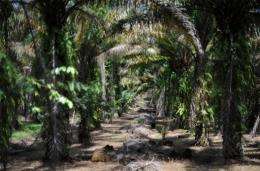Malaysian peatswamps obliterated for palm oil: study

Peatswamp forests home to such species as the Borneo pygmy elephant are being obliterated in Malaysian Borneo to make way for palm oil plantations, according to a new study.
The Netherlands-based Wetlands International said that the ecologically important forests could disappear from Sarawak state by the end of the decade if the destruction does not cease.
After harvesting much of the valuable timber in Sarawak -- part of Malaysia's half of Borneo, which is shared with Indonesia and Brunei -- companies are now completely clearing the forests to plant oil palms.
"As the timber resource has been depleted the timber companies are now engaging in the oil palm business, completing the annihilation of Sarawak's peat swamp forests," Marcel Silvius from Wetlands said in a statement.
"Unless this trend is halted, none of these forests may be left at the end of this decade."
The environmental group said that until recently two thirds of Sarawak's peatlands were covered with "thick, biodiversity-rich rainforest" but that in the past five years one third of it had been cleared, mostly for conversion to palm oil.
It said that Malaysian government figures seriously underestimated the extent of the problem, and that studies it conducted using satellite images and field surveys gave a very worrying picture.
"The new studies conclude that 20 percent of all Malaysian palm oil is produced on drained peatlands. For Sarawak, this is even 44 percent," it said, adding that the percentage for new plantations was even higher.
Wetlands International said that the forests are home to many endangered species including the pygmy elephant -- the smallest elephant on earth -- the clouded leopard, the long-nosed tapir and many rare birds.
The draining of peatswamps and their conversion to plantations also causes huge carbon dioxide emissions.
"The production of palm oil is welcome only if expansion can be done in a sustainable way," the group said, calling for a complete ban on production on peatlands.
Malaysia is the world's second-largest exporter of palm oil after Indonesia, and the industry is one of the country's top export earners.
The boom in palm oil -- used extensively for biofuel and processed food like margarine -- has not only seen swathes of jungle felled in Borneo, but also threatened the existence of indigenous rainforest tribes.
(c) 2011 AFP

















